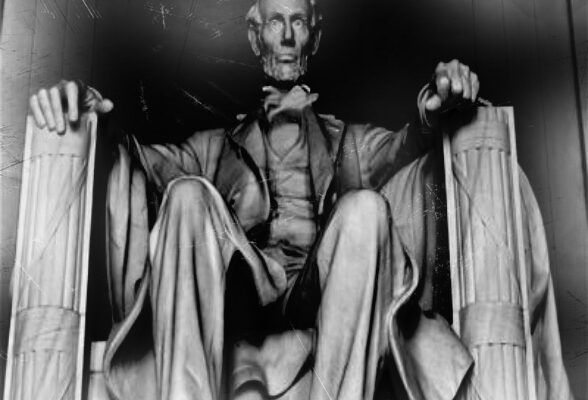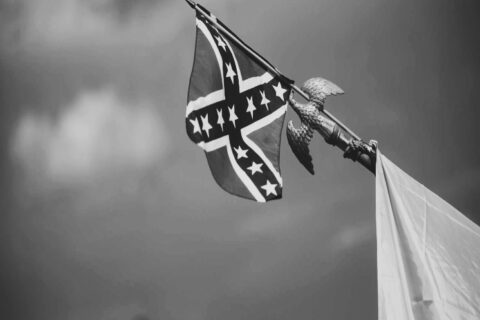Was Lincoln a fascist? It’s interesting to me how people will slap labels on those with whom they disagree, and how the meanings of those labels then become muddled in discourse that leads to widely varying ideas about where systems of governance belong on the confused Left-Right political spectrum.
I remember a lecture by a missionary from South Africa drawing attention to the fasces bundles composing the arms of the throne on which the statue of Lincoln reposes in his D.C. memorial. In the same lecture, he then also called attention to the fact that Lincoln’s memory is celebrated in communist Cuba. Is there a contradiction here? I don’t think so, but not because I would without explanation equate fascism with communism. In like manner, neither would I use the terms socialism and communism interchangeably.
Perhaps it would be helpful in at least giving pause to some of the authors of confusion – of which I hope you won’t count me as one at the conclusion of this piece – if we’d ask ourselves: “what are the sine qua non (without which, not) elements of the labels we use?” For example, as I understand it, two non-negotiable elements for all professing communists are atheism and internationalism. Trotsky and Stalin were both atheists, but there was a parting of the ways when Trotsky saw that Stalin’s commitment to internationalism and perpetual revolution was giving way to Bonapartism and a commitment to Russian hegemony.
Stalin and the Soviets smeared any opposition to themselves as “fascist,” but consider that “Lenin had repeatedly advised his followers to accuse their opponents of the crimes they themselves were planning, in order to protect themselves and confuse the public.”
“Marx was a genius… “Communism” he says, “must win because Capital will give it that victory, though its enemy.” … Communism can triumph as the result of inborn idiocy… To be able to achieve the transformation of homo sapiens [sagacious man] into homo stultum [foolish man] is to possess magical force, capable of bringing man down to the first stage of the zoological ladder, i.e. to the level of the animal. Only if there is homo stultum in the epoch of the apogee of Capitalism could Marx formulate his axiomatic proposition: contradictions plus time equal Communism.”
J. Landowsky, Red Symphony, trans. George Knupffer, Christian Rakovsky Interrogation
Contradictions plus time equal Communism. Now there’s a phrase to remember in sorting things out!
The “without which, not” for true fascism is that the totalitarian authority of the state trumps any considerations of family, community, or the value of personality. National Socialist Germany was not fascist. The Reich was authoritarian, but not totalitarian, and it’s an important distinction. Communists, true fascists, and the puppet masters of “democratic” liberalism’s sell-out politicians, are totalitarian. Lincoln’s forced Union was totalitarian. The various political systems in the world that actually do, in the various ways tailored to the natural and historical proclivities of their peoples, promote freedom of association, political self-determination, ethnic nationhood, and the value of personality, have, at backs-against-the-wall times realized, that you can’t fight a forest fire in a fire engine with a Robert’s Rules of Order in the glove box. All conservatism stands weak against radicalism.
“Humanity acts as if it does not understand what Communism is, as if it does not want to understand, is not capable of understanding. It is precisely because its essence is beyond comprehension, perhaps, that Communism is so difficult to understand. p. 54. This is something which is almost incomprehensible to the human mind: a burning greed for profit that goes beyond all reason, all self-control, all conscience, only to get money. pp. 12-13. It is a system where the constitution has never been adhered to for one single day; where all the decisions are reached in secrecy, among a small, irresponsible clique and are then flung down on us and on you like a bolt of lightning.” p. 38.
Solzhenitsyn, Warning to the West, trans. The Bodley Head Ltd
To return to the opening question: Was Lincoln a fascist? Yes, I think the sculptors of the memorial got it right. His own arrogated authority, which he grounded on a supposed inviolable perpetual union, in his twisted mind trumped all blood ties and lawful constitutional considerations. He himself admitted this, as I pointed out in an earlier article on this site, when he rationalized violating his oath to uphold the Constitution in order to preserve (?) a nation – now really an empire – formerly sworn and bound to live by the terms of that document.
It’s also been pointed out by some that one of his primary motivations for not just “letting the South go” was because he didn’t want to lose the revenue from the then most prosperous area of the Union. Was he a Communist Internationalist? Probably not, but his actions certainly furthered their ends, and Marx hailed the Union victory. The cost of his war of aggression undid the prior stand of the Andrew Jackson administration against a national bank.
“In 1862, rather than pay the central bankers 24-36% interest, Lincoln printed “Greenback” banknotes… However, under pressure to find enough money to win the war, “Lincoln allowed the bankers to push through the National Banking Act of 1863 in exchange for their support for the urgently needed additional Greenbacks.” p. 186. Mr. [John] Sherman [Ohio] declares that there has never been such an opportunity for capitalists to accumulate money, as that presented by this act, and that the old plan of State Banks is so unpopular that the new scheme will, by contrast, be favorably regarded, notwithstanding the fact that it gives the National Banks an almost absolute control of the National finance. p. 187. As historian John Kenneth Galbraith explained: “In numerous years following the war, the Federal government ran a heavy surplus. It could not [however] pay off its debt, retire its securities, because to do so meant there would be no bonds to back the national bank notes. To pay off the debt was to destroy the money supply.” p. 188.
Gerard Menuhin, Tell the Truth and Shame the Devil
It seems fitting to close this piece with an excerpt from Adolf Ehrt’s Communism in Germany that reads like it might just as well be addressed to 2023 America, and describes so well the stake all of us have in the issue of this ongoing contest that’s endured so many setbacks. The language is in portions hauntingly reminiscent of James Henley Thornwell’s sermon “The Rights and Duties of Masters.”
“The decisive days of the year 1933 saw a peculiar historical drama in Germany – the clashing of two revolutions, a renaissance and an insurrection, the violent collision of which crushed and destroyed the hitherto existing form of government. The nation remained triumphant on the field. It had not fought only for itself, for its freedom and its future; it felt it was bearing arms for all Western Christian nations in a war against Bolshevism. The decisive battle between faith and godlessness, between national consciousness and internationalism, between spirit, honor and character on the one side, and bestiality, dishonor and crime on the other, was fought on German soil. p. 177. It is not only Germany’s “own affair”, because no other nation can be disinterested in whether the heart of Europe sinks into Bolshevism or sets about an internal and external healing process in an honest and inspired manner… May other nations and states have sufficient insight and good will to recognize this and follow the German example. The destruction of the Communist International is a task for the nations of the whole of the Christian and civilized world.” p. 179.
Adolf Ehrt, Communism in Germany
-By German Confederate

O I’m a good old rebel, now that’s just what I am. For this “fair land of freedom” I do not care at all. I’m glad I fit against it, I only wish we’d won, And I don’t want no pardon for anything I done.






The short answer is, No. Fascism, as defined and instituted by Mussolini, is a form of totalitarian (his coinage) socialism. And it comes with a theory of how an economy works best: syndicalism–workers, owners, and managers together control cartels, and set prices, wages, production levels.
I am not sure that syndicalism was ever actually implemented in Italy; the war intervened. But even “socialism” is an inappropriate anachronism for Lincoln. It is not even clear he can be called a “dictator,” although he was authoritarian. Of course, his entire administration was during the war. Who knows what he would have done in a peacetime regime.
German Confederate
“To pay off the debt was to destroy the money supply”
From the book ‘Lincoln, money martyred.’ By Dr. R.E Search 1935 p. 47-48 easily found at archive dot com.
THE HAZARD CIRCULAR
“Slavery is likely to be abolished. This I and my European friends are in favor of, for slavery is but the owning of labor, and carries with it the care of the laborers, while the European plan, led on by England, is that capital shall control labor by controlling wages.
The great debt that capitalist will see to it is made out of the war (our own civil war) must be used to control the value of money, to accomplish this, the government bonds must be used as a banking basis”.
I could have chose several quotes from this portion of the book in which the author shows how that the Lincoln ‘government backed currency’, the greenback, was eliminated. (a book I couldn’t put down when I first read it) notice how slavery became an issue 2 years into the so called American Civil War after the bankers got control of the money supply and ended the government backed currency.
It truly was the second American Revolutionary War.
May God deliver the Southland from this tyranny and help us to restore the promise of freedom we fought for the first time!
Nice seeing you write articles again German Confederate, God Bless You Sir.
Thanks for the comments Outside Looking In. I think we as Americans have a myopic one-size-fits-all view of different forms of government. We have to remember that these European nations were wise to the stranglehold of international finance and its purposes, and were fighting it in the best way they knew how. Besides, even Mussolini’s fascism (neo-fascism) underwent revision and became much more nationalistic over the course the war. The use of authority and power was, I think, much more pragmatic with them than with Lincoln.
Possibly, could the Fasces be a connection with Rome?. There was allot of admiration for the Greeks and Romans in Early America.